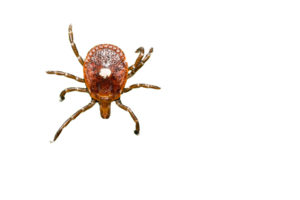Alpha-Gal Syndrome (Mammalian Meat Allergy)

Meat allergy is an increasing problem over the last decade. It is generally not that people have developed a typical food allergy to meat in the classic sense, but this increase has rather occurred because of an entity called alpha-gal syndrome. It is often referred to as mammalian meat allergy, red meat allergy, and tick bite meat allergy. More specifically, alpha-gal syndrome is a food allergy to red meat (i.e., mammalian meat) and any other products made from mammals such as gelatin or milk products. The condition was discovered by researchers at the University of Virginia a little more than a decade ago.

The mechanism of why and how the syndrome occurs is quite interesting. Alpha-gal, technically referred to as galactose-alpha-1,3-galactose, is a carbohydrate (i.e., sugar molecule) that is present in most mammals (e.g., cows, pigs, sheep, deer, rabbits, whales). It is not found in humans or non-mammals such as fish, birds, and reptiles. Alpha-gal syndrome is caused by a Lone Star tick bite. After an individual is bitten by a Lone Star tick, the carbohydrate alpha-gal which is present in the tick’s saliva, is transmitted into the person’s blood stream. As a result, the individual will produce IgE antibodies as a defense mechanism against this foreign sugar molecule (i.e., carbohydrate). Because the person now has alpha-gal IgE antibodies present in their blood stream, whenever that individual consumes future mammalian meat which contains alpha-gal, their alpha-gal IgE antibodies will react against the alpha-gal present in the mammalian meat (e.g., beef, pork, lamb, venison, rabbit, whale) causing allergic symptoms.
The symptoms of alpha-gal syndrome or mammalian meat allergy are typically delayed approximately 2-8 hours after the person eats the meat before manifesting. This is in contrast to a “normal” allergic reaction to a food which usually causes symptoms within 30 minutes after ingestion. The symptoms of alpha-gal syndrome can vary in severity from mild to severe and may consist of hives (i.e., urticaria), generalized itching (i.e., pruritus), swelling episodes (i.e., angioedema), runny nose, nasal congestion, wheezing, coughing, shortness of breath, abdominal pain, nausea, vomiting, diarrhea, dizziness, drop in blood pressure, and/or anaphylaxis. Obviously, anaphylaxis is life-threatening and individuals who have a history of anaphylaxis should use an injectable epinephrine device such as an EpiPen, Auvi-Q, or Adrenaclick if anaphylactic symptoms occur. They should also go immediately to the closest emergency room if they use their injectable epinephrine device.
The diagnosis of alpha-gal syndrome is made by performing a comprehensive history and physical examination. A history of a recent tick bite makes the diagnosis more likely, but it is not crucial as not all patients may remember if they had a recent tick bite. Since there is a delay between the ingestion of meat and the onset of symptoms with alpha-gal syndrome, the condition is underdiagnosed. Physicians may not see the connection between the ingestion of the meat and the beginning of allergic symptoms because of this time delay which is not characteristic of a normal allergy. As a result, the syndrome is underdiagnosed. Note: It is therefore important to seek out a board certified allergist like the ones at Black & Kletz Allergy in order to make the correct diagnosis. It is also important to note that since the allergic symptoms of alpha-gal syndrome are very common allergy symptoms, an allergist is often needed to differentiate these symptoms from other allergic conditions that are not tick-induced. Blood tests and/or food prick testing is usually necessary to confirm the diagnosis.
The prevention of alpha-gal syndrome is the prevention of tick bites. One should avoid places where ticks live such as in grassy or wooded areas. Wear long-sleeved shirts and pants. Wear hats and gloves. Use insect repellants, especially containing DEET. Check yourself and your pets for ticks after being outdoors in the grass or woods. Taking a shower after you return from outside may remove unattached ticks. If bitten, remove the tick as soon as possible either by yourself or by a physician in an emergency room. Do not squeeze or squash the tick. Let your physician know if you have been bitten by a tick as there are other diseases that can be caused by tick bites. Some of these diseases may include Lyme disease, Rocky Mountain spotted fever, Tularemia, Babesiosis, Ehrlichiosis, Rickettsiosis, Tick-borne encephalitis, Relapsing fever, Q Fever, Anaplasmosis, and Powassan.
The treatment of alpha-gal syndrome is also simply prevention. It is important to avoid the ingestion of mammalian meat and any other products made from mammals such as gelatin or milk products. Furthermore, one should avoid getting bitten again by ticks as it is thought that subsequent Lone Star tick bites may cause more severe disease if exposure to mammalian meat occurs.
The board certified allergy specialists at Black & Kletz Allergy have been diagnosing and treating alpha-gal syndrome and food allergies in both adults and children for more many years in the Washington, DC, Northern Virginia, and Maryland metropolitan area. We have 3 office locations, all of which offer on-site parking. Our offices are located in Washington, DC, McLean, VA (Tysons Corner, VA), and Manassas, VA. The Washington, DC and McLean offices are Metro accessible and there is a free shuttle that runs between our McLean, VA office and the Spring Hill metro station on the silver line. For an appointment, please call us at one of our locations or alternatively, you can click Request an Appointment and we will respond within 24 hours by the next business day. The allergy specialists at Black & Kletz Allergy have the expertise in alpha-gal syndrome and food allergies. Our goal is to serve the greater Washington, DC metro community with first-rate allergy care with boundless commitment and great pride as we have done for over 50 years.
